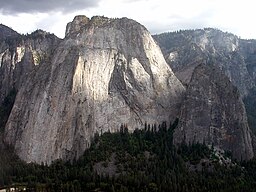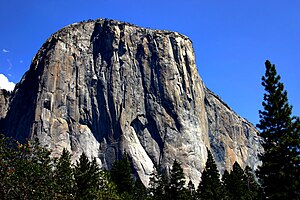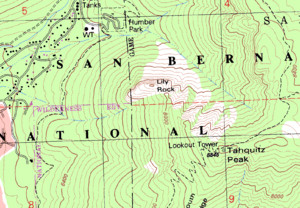ಟೆಂಪ್ಲೇಟು:Infobox climbing route/doc
| This is a documentation subpage for ಟೆಂಪ್ಲೇಟು:Infobox climbing route It may contain usage information, categories and other content that is not part of the original ಟೆಂಪ್ಲೇಟು page. |
| East Buttress Route | |
|---|---|
 Middle Cathedral Rock viewed from the face of El Capitan to the north. The East Buttress Route runs the left profile. | |
| ಸ್ಥಳ | ಕ್ಯಾಲಿಫೊರ್ನಿಯ, USA |
| ಕಕ್ಷೆಗಳು | 37°42′56″N 119°38′15″W / 37.71556°N 119.63750°W |
| ಕ್ಲೈಂಬಿಂಗ್ ಪ್ರದೇಶ | Yosemite Valley |
| ಮಾರ್ಗ ಪ್ರಕಾರ | Trad climb |
| ವರ್ಟಿಕಲ್ ಗೈನ್ | 1,100 feet (300 m) |
| ಪಿಚ್ | 11 |
| ಗ್ರೇಡ್ ರೇಟಿಂಗ್ | 5.10c or 5.9 A0 |
| ಮಾರ್ಗದ ಉದ್ದ | IV |
| ಮೊದಲ ಆರೋಹಣ | Warren Harding, Jack Davis, & Bob Swift, 1954. |
| ಮೊದಲ ಉಚಿತ ಆರೋಹಣ | Frank Sacherer & Ed Leeper, 1965. |
This template can be used to create an infobox for articles about climbing routes.
Usage
[ಬದಲಾಯಿಸಿ]This box includes the most often used parameters. Specify the coordinates for the start of the route.
{{Infobox climbing route
| name =
| photo =
| photo_width =
| photo_caption =
| map =
| map_width =
| map_caption =
| location =
| coords =
| lat_d = | lat_m = | lat_s = | lat_NS =
| long_d = | long_m = | long_s = | long_EW =
| coords_ref
| climbing_area =
| route_type =
| vertical_gain =
| pitches =
| rating =
| grade =
| route_setter =
| first_ascent =
| first_free_ascent =
| fastest_ascent =
}}
Parameter descriptions
[ಬದಲಾಯಿಸಿ]This table describes all the parameters available. Many are seldom used and a functional infobox can be created using the parameters listed above.
| Parameter | Description |
|---|---|
name
|
Name of the route, the article is likely disambiguated but this name in the infobox should be the undisambiguated name. For example, The Nose for The Nose (El Capitan). This field is required. |
other_name
|
Other names by which the route is known. |
photo
|
Photograph of the mountain. Preferably a distance shot to show most/all of the mountain rather than a view from the summit. Do not include the "Image:" prefix. If uploading a new image, please put them on Commons so they can be easily used by the other language wikipedias. |
photo_width
|
Determines the width of the photograph. The default and maximum value is 300px. Images with a horizontal orientation (landscape mode) will generally display well at the default setting. An image with vertical orientation (portrait mode) will need to be adjusted. For example photo_width=200 and not photo_width=200px.
|
photo_alt
|
Alt text for the map. See WP:ALT. |
photo_caption
|
Description of the photograph which is displayed below. Include the month and year if known. |
map
|
The name of the map to be displayed. See Map display methods. |
map_width
|
Determines the width of the map. The default width is 220px and maximum width is 300px. For example map_width=180 and not map_width=180px.
|
map_alt
|
Alt text for the map. See WP:ALT. |
map_caption
|
The caption that will appear below the map if one is required. |
relief
|
Selects a relief map when assigned any value. This is functional when a location map template is used. See Map display methods. |
mark
|
A marker which shows the location of the route on a map. The default image is Red pog.svg. For more information, go here. |
marker_width
|
The width of the location marker image in pixels. Seldom used. The default width is 8px. |
label_position
|
This seldom used parameter will generate a text label next to the a location marker. Valid values are left, right, top and bottom. If no value is assigned to the label parameter below, the name will be used.
|
label
|
Text that will be displayed next to the location marker. See label_position above.
|
location
|
Province or state first, followed by country. For USA, the county is optional but if given, be provided before the state. |
coords
|
For the {{Coord}} template. This syntax will not automatically generate a location marker on a map. When this option is used the type, region, scale, source, format and display parameters are not functional but this data can be entered in the {{Coord}} template. The defaults should be type:landmark and display:inline,title.
|
lat_d
|
The degrees of latitude. This value can be specified as a decimal degree and when this format is used minutes and seconds should not be specified. |
lat_m
|
The minutes of latitude. |
lat_s
|
The seconds of latitude. |
lat_NS
|
N if north of the equator, S if south of the equator. Other values will be disregarded. |
long_d
|
The degrees of longitude. This value can be specified as a decimal degree and when this format is used minutes and seconds should not be specified. |
long_m
|
The minutes of longitude. |
long_s
|
The seconds of longitude. |
long_EW
|
E if East of the prime meridian, W if west of the prime meridian. Other values will be disregarded. |
coords_ref
|
Used with either coordinate display method above. Strongly recommended. Specify a citation for the coordinates using <ref>...</ref> tags.
|
type
|
Type is one way to specify the scale of maps generated by external map websites. See WP:COORD TYPE for valid values. The default value is landmark which is most appropriate for routes. This parameter and the three below help GeoHack in selecting suitable map resources.
|
scale
|
Determines the zoom factor for external map websites. See WP:COORD SCALE. Using scale=50000 will change the zoom factor to 1:50,000.
|
region
|
A country code. See ISO 3166-2:US, ISO 3166-2 and ISO 3166-1 alpha-2. For example US-OR is the code for Oregon. This computer readable code is recommended. It will not be displayed. See WP:COORD REGION. |
source
|
Source of the coordinate data. See WP:COORD SOURCE. It will not be displayed. |
format
|
Determines the format used to the display coordinates. Valid values are dms for degrees, minutes and seconds, and dec for decimal degrees. The default is dms.
|
display
|
Determines where the coordinates will be displayed. Valid values are inline and inline,title. The default is inline,title and is recommended.
|
xy |
Specifies the position of the location marker on a map image. The coordinates of the marker in pixels based on a map with a width of 1000 pixels. The template will scale these values for proper display. See below. |
x%y% |
Specifies the position of the location marker on a map image. x% specifies the percentage of the distance across the image from the left edge and y% specifies the percentage of the distance down from the top edge. See below.
|
climbing_area
|
Name of the climbing area. Example: Indian Creek. |
route_type
|
Likely will refer to climbing style but should be described in the best possible way. Examples: Aid Climbing, Trad, Sport, Bouldering, Rock/Ice, alpine, or whatever makes sense. |
vertical_gain
|
Vertical height of the climb from start to finish. |
pitches
|
Traditional number of pitches used to complete the climb. |
rating
|
Difficulty rating in what ever is the standard format for the area. See Grade (climbing). |
grade
|
Roman numeral Grade that indicates the length and seriousness of the route in YDS Grade system. Range: Grade I (1-2 hour climb) to Grade VII (climb lasting a week or longer). |
route_setter
|
Usually the individual who bolted a sport climb. |
first_ascent
|
The climber then year of the first ascent. |
first_free_ascent
|
The climber then year of the first free ascent. This is often the same as the first ascent but can be significant when it is not. |
fastest_ascent
|
Significant for a few climbs, unimportant for most. |
Example
[ಬದಲಾಯಿಸಿ]The Nose
[ಬದಲಾಯಿಸಿ]| The Nose | |
|---|---|
 Southwest face of El Capitan from Yosemite Valley | |
| ಸ್ಥಳ | ಕ್ಯಾಲಿಫೊರ್ನಿಯ, USA |
| ಕಕ್ಷೆಗಳು | 37°44′02.4″N 119°38′13.2″W / 37.734000°N 119.637000°W |
| ಕ್ಲೈಂಬಿಂಗ್ ಪ್ರದೇಶ | Yosemite Valley |
| ಮಾರ್ಗ ಪ್ರಕಾರ | Aid climbing |
| ವರ್ಟಿಕಲ್ ಗೈನ್ | 2,900 feet (900 m) |
| ಪಿಚ್ | 31 |
| ಗ್ರೇಡ್ ರೇಟಿಂಗ್ | 5.13+ or 5.8 C2 |
| ಮಾರ್ಗದ ಉದ್ದ | VI |
| ಮೊದಲ ಆರೋಹಣ | Warren Harding Wayne Merry and George Whitmore, 1958 (45 days). |
| ಮೊದಲ ಉಚಿತ ಆರೋಹಣ | Lynn Hill 1993 |
| ಸ್ಪೀಡ್ ಕ್ಲೈಂಬಿಂಗ್ | 2:37:05 Hans Florine and Yuji Hirayama, 2008. |
{{Infobox climbing route
| name = The Nose
| photo = Yosemite El Capitan.jpg
| photo_caption = Southwest face of El Capitan from [[Yosemite Valley]]
| location = [[California]], USA
| other_name =
| coords = {{coord|37|44|02.4|N|119|38|13.2|W|type:mountain_region:US}}
| climbing_area = [[Yosemite Valley]]
| route_type = [[Aid climbing]]
| vertical_gain = {{convet|2900|ft}}
| pitches = 31
| rating = 5.13+ or 5.8 C2
| grade = VI
| route_setter =
| first_ascent = [[Warren Harding]] [[Wayne Merry]] and [[George Whitmore (climber)|George Whitmore]], 1958 (45 days).
| first_free_ascent = [[Lynn Hill]] 1993
| fastest_ascent = 2:37:05 [[Hans Florine]] and [[Yuji Hirayama]], 2008.
}}
Open Book
[ಬದಲಾಯಿಸಿ]| Open Book | |
|---|---|
 The first two pitches follow the obvious corner. | |
| Map showing the approximate location of Open Book | |
| ಸ್ಥಳ | Tahquitz Peak, ಕ್ಯಾಲಿಫೊರ್ನಿಯ, USA |
| ಕಕ್ಷೆಗಳು | 33°45′38″N 116°41′06″W / 33.7605°N 116.685°W |
| ಕ್ಲೈಂಬಿಂಗ್ ಪ್ರದೇಶ | Tahquitz |
| ಮಾರ್ಗ ಪ್ರಕಾರ | Trad |
| ವರ್ಟಿಕಲ್ ಗೈನ್ | 300 feet |
| ಪಿಚ್ | 3 |
| ಗ್ರೇಡ್ ರೇಟಿಂಗ್ | 5.9 |
| ಮೊದಲ ಆರೋಹಣ | John Mendenhall & Harry Sutherland, 1947. |
| ಮೊದಲ ಉಚಿತ ಆರೋಹಣ | Royal Robbins & Don Wilson, 1952. |
{{Infobox climbing route
| name = Open Book
| photo = Open Book Tahquitz.JPG
| photo_caption = The first two pitches follow the obvious corner.
| photo_width = 220
| map = Map of Tahquitz Peak.png
| map_width = 300
| map_caption = Map showing the approximate location of Open Book
| x = 526
| y = 293
| location = [[Tahquitz Peak]], [[California]], [[USA]]
| coords = {{coord|33.7605|N|116.685|W|type:mountain_region:US}}
| climbing_area = [[Tahquitz]]
| route_type = [[Traditional climbing|Trad]]
| vertical_gain = 300 feet
| pitches = 3
| rating = 5.9
| grade =
| route_setter =
| first_ascent = [[John Mendenhall (climber)|John Mendenhall]] & [[Harry Sutherland]], 1947.
| ffa = [[Royal Robbins]] & [[Don Wilson (climber)|Don Wilson]], 1952.
| fastest_ascent =
}}
Map display methods
[ಬದಲಾಯಿಸಿ]Wikipedia does not currently have many maps that would be useful in articles about climbing routes and so this functionality might be only marginally useful. Don't use state or national maps to show the location of routes. There are three ways to display a marker on a map.
Display a marker on a map using a template and geographic coordinates
[ಬದಲಾಯಿಸಿ]A marker can be superimposed on a map using one of a set of special map templates. To display a marker the geographic coordinates must be specified using the parameters lat_d, long_d, etc. See the documentation for {{Location map}}. The parameters for this template map to a subset of the parameters used by {{Location map}}. A map template can be found using these sources:
- List of templates - Many of the listed items are redirects and a few templates may not function as expected.
- ವರ್ಗ:Location map templates - templates sorted by category.
- Special:WhatLinksHere/Template:Location map/Info - a search that might help.
- Special:Prefixindex/Template:Location map - another search that might help.
All of the names begin with the words "Location map" followed by the area covered. The value you need to specify is the area name. The map template for the Canada is Location map Canada. In this case specify map=Canada.
| Four Corners, Canada | |
|---|---|
| Example using geographic coordinates | |
| ಕಕ್ಷೆಗಳು | 60°00′00″N 102°00′00″W / 60.00000°N 102.00000°W |
{{Infobox climbing route
| name = Four Corners, Canada
| map = Canada
| map_caption = Example using geographic coordinates
| lat_d = 60 | lat_m = 00 | lat_s = 00 | lat_NS = N
| long_d = 102 | long_m = 00 | long_s = 00 | long_EW = W
}}
Display a marker on any map image using the x and y parameters
[ಬದಲಾಯಿಸಿ]The values for the x and y parameters are the pixel coordinates of the location mark when the image is scaled to a width of 1000 pixels.
xis the pixel offset for the mark from the left edge of an image 1000px wide.yis the pixel offset for the mark from the top edge of an image 1000px wide.
There are at least two ways of obtaining these values:
- Download the image from the image's file page to your computer. Open the image in a graphics editor, such as GIMP or XnView. Scale (resize) the image to a width of 1000px and then note the x, y coordinates when the cursor points to the desired location. Use these values directly.
- Download the image from the image's file page to your computer. Open the image in any image viewer that displays the coordinates of the cursor position, such as Paint from Microsoft. Note the x, y coordinates when the cursor points to the location. Then:
- 1000 · x'/w = x and 1000 · y'/w = y
- where x' and y' are the cursor coordinates, w is the width of the image displayed on your computer and x and y are the values to assign to the
xandyparameters.
- where x' and y' are the cursor coordinates, w is the width of the image displayed on your computer and x and y are the values to assign to the
| Four Corners, Canada | |
|---|---|
| Example using the x and y parameters |
{{Infobox climbing route
| name = Four Corners, Canada
| map = Canada location map.svg
| map_caption = Example using the x and y parameters
| x = 369
| y = 487
}}
Display a marker on any map image using the x% and y% parameters
[ಬದಲಾಯಿಸಿ]- x% specifies the percent of the distance across the image from the left edge.
- y% specifies the percent of the distance down from the top edge.
In the following example the marker is 36.9% of the way across and 57.4% of the way down.
| Four Corners, Canada | |
|---|---|
| Example using the x% and y% parameters |
{{Infobox climbing route
| name = Four Corners, Canada
| map = Relief map of Canada.png
| map_caption = Example using the x% and y% parameters
| x% = 36.9
| y% = 57.4
}}




